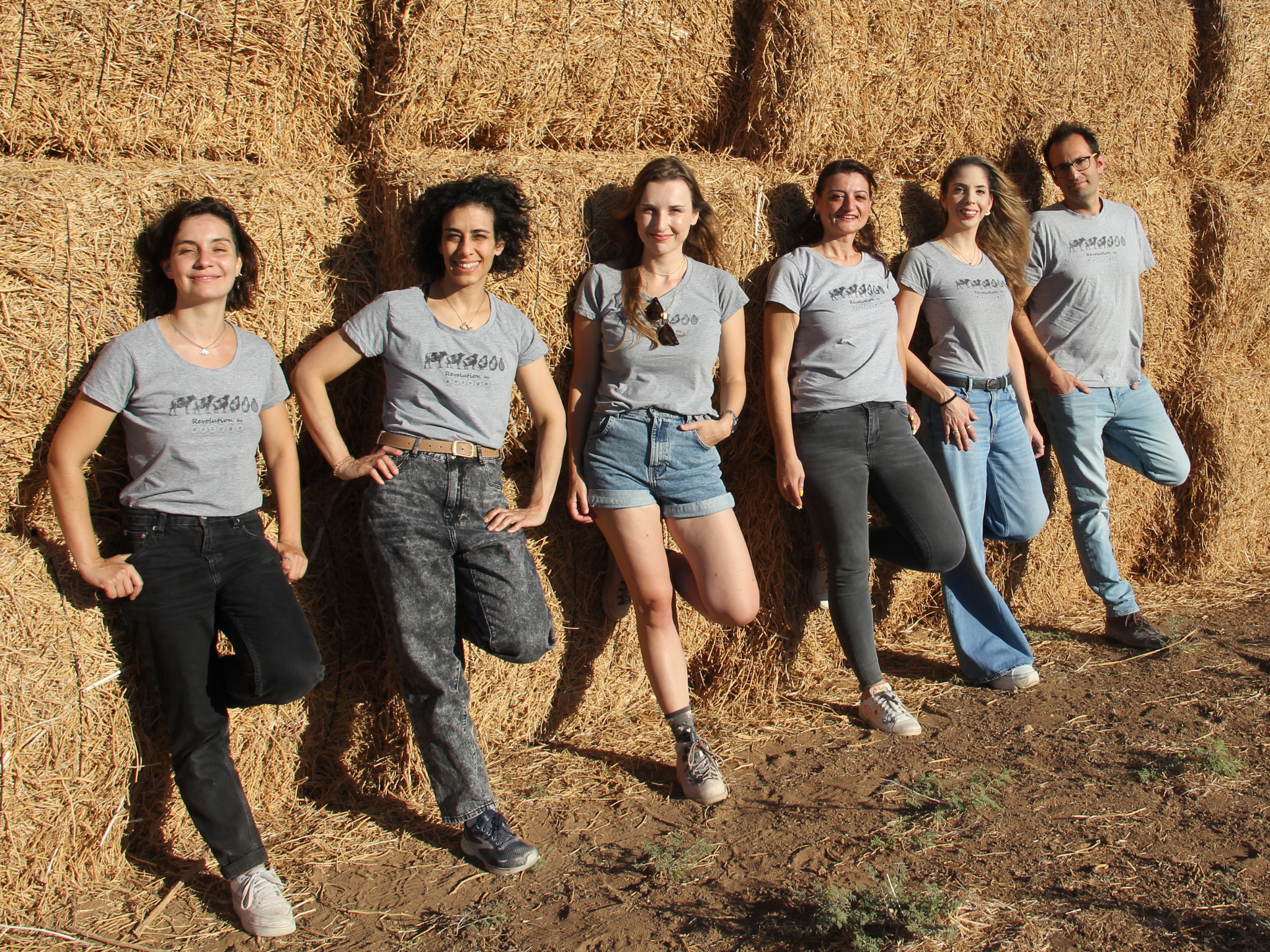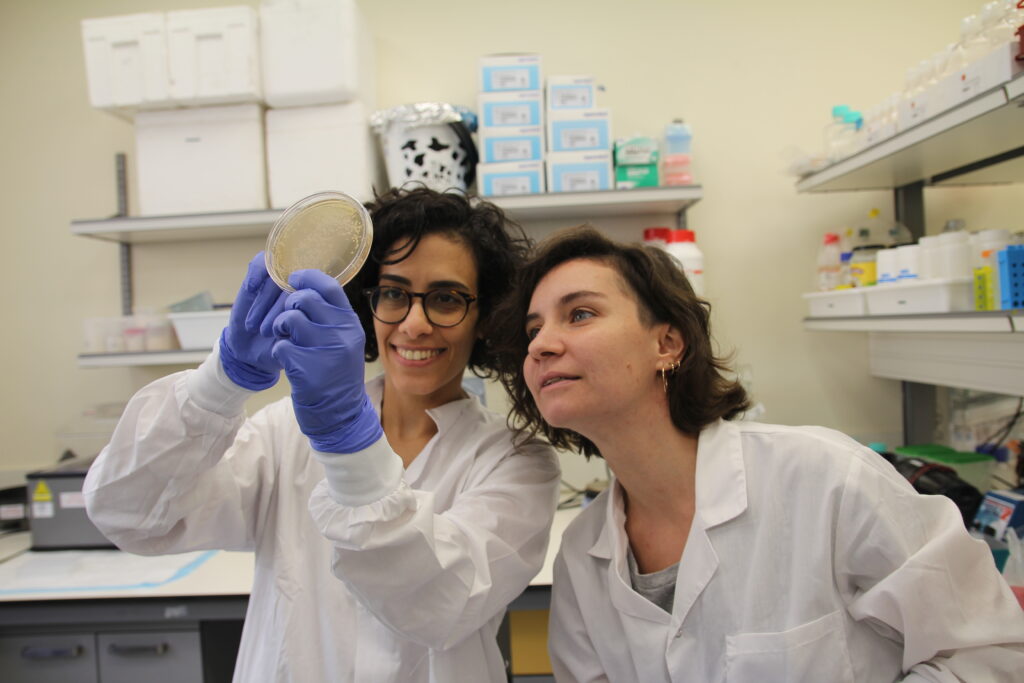
Israeli startup DairyX Foods has developed a method to make precision-fermented casein proteins that self-assemble into micelles.
To deliver stretchy, melty cheese and firmer, creamier yoghurt free from cows, DairyX Foods has come upon a novel solution for its precision fermentation technology.
The Israeli startup has created animal-free casein proteins that mimic their bovine counterparts by folding themselves into micelles, which are spherical structures that prove as a building block for the functional and nutritional attributes of dairy products.
Known as the “holy grail” of milk protein structure, casein accounts for 80% of the protein content in milk, and is responsible for properties like emulsification, thickening, and foaming. There are four kinds of casein proteins in cow’s milk, which self-organise into micelles. Here, they remain suspended in the highly hydrated solution, bound together with minerals like calcium and phosphate.
“The micelle is responsible for key properties in dairy, including stability, solubility, functionality (the ability to coagulate), and sensory profile that individual casein molecules cannot fully achieve on their own,” Arik Ryvkin, founder and CEO of DairyX, tells Green Queen. This is why reconstituting the entire micelle is essential, since it “replicates the natural structure and functionality found in bovine milk”.
The startup has raised $2M in pre-seed funding from Peregrine Ventures, Jesselson Capital, and Abic Biological Laboratories, with additional backing from the Israeli Innovation Authority’s incentive incubator. “Our investors play a key role in our success, offering valuable strategic guidance and market entry support,” says Ryvkin.
How DairyX’s technology produces micelle-forming casein proteins

There are several startups making animal-free casein via precision fermentation or molecular farming, including New Culture, Change Foods, Standing Ovation, Eden Brew, Moolec, Miruku, Fooditive Group, and Alpine Bio. But most of these are focused on only one or two casein classes.
“The industry knows quite well that caseins are extremely hard to produce using precision fermentation, so our initial goal was to solve this problem,” says Ryvkin. Once we successfully crafted caseins, the next major challenge was to upgrade caseins so they could self-assemble into gelating micelles to produce the dairy properties manufacturers are seeking.”
This is why DairyX is prioritising the functionality of casein proteins, specifically their ability to gelate and form micelles. “This functionality depends on the self-assembling nature of the caseins we produce – what we refer to as ‘smart casein’,” explains Ryvkin.
“A protein’s function is influenced not just by its amino acid sequence, but also by other molecules added to it, known as post-translational modifications (PTMs),” he adds. “We’ve designed our strain to produce casein that not only matches the amino acid sequence of milk casein, but also carries the same PTMs, which are crucial for its self-assembly and performance, just as it does in milk.”
The casein produced through the patent-pending technology is non-GMO, notes Galit Kuznets, head of strain development and fermentation at DairyX. “Our casein also eliminates the need for hormones and antibiotics applied in dairy farms,” she says.
“We have achieved several key objectives with our solutions. Our biological design genetically manipulated yeast to produce functional caseins that we organised into micelles. We developed a fast-tracked screening process that simulated evolution to locate super-producers of protein from among millions of yeast strains,” outlines Kuznets.
“Our machine-learning models simulated fermentation to determine optimal fermentation conditions. We have proven our ability to create a gel from reconstituted casein micelles. All these ingenuities have helped us work smarter and faster to create highly functional micelles.”
High-performing strain with multi-pronged gains for manufacturers

DairyX is now working to scale up production by collaborating with manufacturing facilities, and expanding its footing in the industry via partnerships with food companies. Through the economies of scale, it will also be able to reduce its costs. Over the last two years, it has brought prices down 20-fold, and expects to reach price parity (or even lower) “in a few years”.
“We recognise that price is one of the two most critical factors for success in this industry, and we’re committed to continuously cutting our costs,” says Ryvkin. “We’re achieving this by improving our yeast strains to secrete at higher titers as covered by our IP and patents.”
This effort is also being facilitated by yeast strains that produce “exceptionally high” yields of casein in short timeframes. “We are using Pichia pastoris, a yeast strain recognised as safe for food ingredient production by the FDA,” reveals Ryvkin. Now known as Komagataella phaffii, this is the same strain that powers the heme ingredient in the Impossible Burger.
“It has been widely used to produce over 5,000 recombinant proteins, including biopharmaceuticals and industrial enzymes. We chose Pichia because of its ability to grow to high cell densities and secrete large amounts of protein directly into the culture broth, which simplifies downstream processing,” Ryvkin adds.
Most animal-free dairy producers currently have to make do with additives like stabilisers, emulsifiers and thickeners, and DairyX argues that the end result isn’t as high-performing as conventional milk, and can additionally lend “unpleasant aftertaste”. The startup says its bioidentical protein – free from cholesterol and lactose – gives CPG producers the versatility to choose which fats and sugars to add to their products.
“Another significant challenge that dairy companies face is adapting their production facilities to use new ingredients,” explains Bar-Zeev, the startup’s product development and downstream processing lead. “This is why we created a drop-in replacement for milk that does not require process changes or retooling.”
Startups like Fooditive Group, Eden Brew and Moolec are also developing casein micelles, but DairyX’s “commitment to replicating the exact process used by cows” sets it apart, according to Ryvkin. “We believe this will give us superior functionality, closely matching the properties of real milk. Additionally, we use a unique evolution-based method to develop high-performing yeast strains that are exceptionally efficient in producing caseins,” he says.
DairyX plans 2027 US launch amid declining milk consumption

DairyX is already in talks with several potential partners, with an initial focus on co-developing technology and products over the next few years before a robust commercial launch. “We expect our first product using our casein to hit the market in 2027,” suggests Ryvkin.
Before that, though, it needs to jump through the regulatory hoops – New Culture is the only precision-fermented casein company to have done so, by self-determining GRAS (Generally Recognised as Safe) status in the US. DairyX is also setting its sights on the country first.
“We plan to submit once we have a robust fermentation process at the necessary scale, following the established guidelines and the pathways taken by companies like Perfect Day, Remilk, and Imagindairy,” says Ryvkin (these companies produce animal-free whey). “Our target timeline for filing is currently set for 2026.”
The development of its casein micelles comes during a dairy decoupling in America. The country has lost 95% of its dairy farms since 1970, and that is in keeping with consumption habits too. Overall fluid milk sales have dropped by 20% since 1975, and 8% since the start of this decade, per the USDA. In fact, this figure has been progressively decreasing since 2011.
At the same time, per capita consumption of milk has nearly halved, down by 47% in 2024. With growing awareness about lactose intolerance, animal welfare, and dairy’s big climate footprint – despite the production declines, the US dairy sector has been releasing more greenhouse gases into the atmosphere since 1990, with methane levels more than doubled.
All this necessitates novel solutions. The US is already home to 30% of alt-dairy startups, so targeting this proven market seems a no-brainer for DairyX. The business is well-capitalised for now, helping it advance towards “key R&D milestones”, Ryvkin says. “We plan to raise additional funds when the timing is right to support the next phase of growth.”
The post Israel’s DairyX Foods Unveils ‘Self-Assembling’ Animal-Free Casein Micelles, Eyes 2027 US Launch appeared first on Green Queen.
This post was originally published on Green Queen.